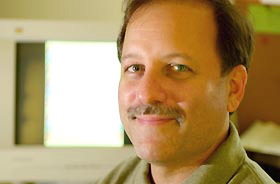|
This is an archived article.
For the latest news, go to the Advance
Homepage
For more archives, go to the Advance Archive/Search Page. | |||
|
Accounting Professor Encourages Skills
Professor Andy Rosman is anything but
fickle.
with Words as Well as Numbers At Hofstra University in the late 1970s, he had three loves. Two of them, journalism and accounting, might be considered an odd mix. The third was tutoring college buddies. The three not only survived, but have formed a perfect union in a UConn teaching career spanning a dozen years. He's integrated the art of writing into the way he teaches complex financial reporting systems, and former students still turn to him for counsel in their professional journeys.
He has advised more than 500 undergraduate accounting interns and continues developing bonds and relationships with hundreds more. "It's artificial for a relationship to end when a student receives a diploma," says Rosman. "In a way, our department warrantees them for life. They're stamped UConn and we continue to help." Rosman, an associate professor of accounting in the School of Business and director of the master's program in accounting and the internship program, was recently named a University Teaching Fellow, the University's highest recognition for teaching. "Andy blends knowledge, rapport, excitement, innovation, effective communication at all levels, and caring outside the classroom into his teaching performance," says Richard Kochanek, professor and head of the accounting department. Rosman also teaches students to write coherently, concisely and under pressure, he says. Perhaps this focus on writing stems from Rosman's own college experience of having to write under deadline in a journalism class about Punxsutawney Phil, the infamous groundhog. "I never felt so stressed in my life," he recalls. "Everybody started typing, and I was still reading the facts." That's why his accounting students are also taught to write well under pressure, with first draft as final copy. "In order to get ahead in any profession, including accounting, technical skills alone aren't going to do it - that's the minimal ticket," says Rosman. "What's going to set individuals apart and promote them through the ranks are people and communication skills." Rosman graduated from Hofstra in 1980 with the highest honors in accounting. He became a Certified Public Accountant in New York, and honed his professional skills in the corporate world at Touche Ross & Co. as a senior accountant. Rosman earned a Ph.D. in business from the University of North Carolina at Chapel Hill in 1989, the same year he arrived at Storrs as an assistant professor. Rosman's professional activities include serving as an expert witness on revenue recognition issues for the Securities and Exchange Commission. He also has been honored as the Lawrence Ackerman Scholar in the School of Business, and received the school's service and outreach award and, on two occasions, the accounting department's teaching award. Rapport with
Students "He didn't just teach from the book," says Erin Macaluso, a financial analyst with Pratt & Whitney. "He brought career experiences and explained what we would see in real life. His teaching reinforced the theory and logic behind my work today." Dave Vining, who holds a master's degree in accounting, credits Rosman's memorable lectures with providing him the tools he needs as an investment systems analyst with Prime Advisors, an asset management company. "He planned every minute of the class and poured value into each minute," says Vining. Part-time graduate student Elizabeth Dubs, who is employed full-time for a CPA firm in Stamford, says Rosman has "challenged" her this semester with difficult but rewarding assignments. "He balances sensitivity and compassion with high standards, good boundaries and clear expectations," says Dubs. Tough but Fair Too often, Rosman says, students spend time mechanically writing notes and not listening to the lecture: "If they have my notes, they don't have to worry about copying accurately, but can focus on understanding the material." He provides incremental learning blocks, building one concept onto another so students can understand comprehensive accounting situations. Take mergers and acquisitions. "That's a massive topic and it's hard for students to get their arms around it," he says. "I provide the framework for the problem and we tweak it each week." Rosman also brings organization and humor into the classroom, traits he admired in his own favorite professors: "Two professors who most influenced me were Nathan Slavin, who taught intermediate financial accounting at Hofstra, and Ralph Polimeni, now dean of Hofstra's School of Business." Rosman says Slavin had an off-the-wall sense of humor. "I've since learned there are times when you need to take a mental breath in class, and so once in awhile I'll tell a story that has some humor," he says. To Polimeni he attributes his ability to present in an organized manner, including handing out teaching notes. He also continues to get ideas for the classroom from colleagues in the accounting department. For the past three years, Rosman has been teaching graduate-level students. And this semester he taught a course via the Internet for the first time. Once again, writing has played a role. "In this format, writing becomes even more critical," he says, "as the class is conducted through e-mails and postings for discussion boards." He taught the writing segment in person to 10 students in Stamford on the first night of class. On Dec. 6, he'll return to the Stamford campus to bring closure to the cyberspace semester face-to-face. But for Rosman, there's never true closure. The last night of class looks set to become the start of some further long-term bonds. Claudia G. Chamberlain |


